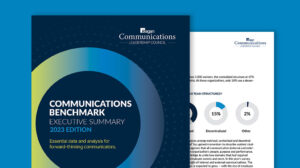How to attract, recruit and retain Gen Z talent
Fresh research from LinkedIn reveals tactics for reaching and resonating with young workers.

Companies are increasingly desperate to crack the code on Generation Z.
What drives and motivates these young folks? And how might you get them on board with your company—instead of ended up on the wrong end of a vitriolic TikTok?
[FREE WEBINAR: Building Culture in the New Digital Workplace]
LinkedIn has published new research that delves into the mindset of this crucial, yet widely misunderstood cohort. The data offers takeaways and reminders that should inform recruiting and retention strategies, including:
- Gen Z is a significant force shaping the workplace (and economy) of tomorrow.
-
- And they’re not just on TikTok or Snapchat. There are 78 million Gen Zers on LinkedIn, representing roughly 10% of LinkedIn’s global member base.
- By 2025, Gen Z workers will make up 27% of the workforce.
- Soon, Gen Z will become the largest generation of consumers, accounting for upwards of $143 billion in direct spending.
- They’re ambitious.
-
- Gen Z is leading “The Great Reshuffle,” with job transitions up 80% year over year, compared to 50% for Millennials and 30% for Gen X.
- Gen Z has surpassed Millennials as the most mobile generation; since the start of the pandemic, their migration rate is up 23%.
- Seventy-seven percent of Gen Zers “believe they will need to work harder compared to those in past generations to have a satisfying and fulfilling professional career.”
- They’re eager to expand their skills.
- Eighty-six percent of Gen Zers are engaged in online learning.
-
- More than two-thirds say they highly value “being in control” and “knowing what’s going on around them.”
- Whereas prior generations focused on soft skills and preferred to learn on weekdays, Gen Z prefers to improve their hard skills—and they don’t mind doing so on weekends.
- When asked about values that are important to them, Gen Z respondents most prioritized “wanting to never stop growing,” “being part of something bigger,” and “valuing transparency/authenticity.”
- They’re motivated by wealth.
- More than 70% see “being successful” and “being financially secure” as top priorities.
Lisa Sy, an insights analyst for LinkedIn who also co-published the research, offers a sobering reminder that companies should brace for Gen Z becoming the dominant force in workplaces—and throughout society:
“Gen Z’s economic power is significant and rising fast. As they join the workforce, their income is estimated to rise more than fivefold to $33 trillion by 2030, and in turn so will their collective purchasing power. It’s clear that Gen Z will soon be the largest consumer segment—and by 2025 will represent 27% of the workforce—driving not just the economy but political and social systems.”
So how can companies get on their good side? Sy says: “From work-life balance and flexibility to benefits and pay, Gen Zers are looking for more than just a 9-5 job. Gen Zers value relationships, especially with companies that are authentic, reliable, socially responsible and communicative in an honest and authentic way.”
She says to reach this vital pool of young workers “companies must utilize a members- first, transparent and honest communication strategy.” And to do a better job of recruiting and retaining them, “companies must focus on listening to feedback and showcasing a passion for employee advocacy.”
She sums up the challenge ahead for employers:
“Because Gen Zers are now looking for increased flexibility and opportunities for long-term growth, it’s crucial for employers to provide quality benefits and job security to retain talent. Gen Zers are now more mobile than ever, and are tempted to switch industries or careers in order to find employers that match and align with their values more closely. With Gen Z’s ambitious and career driven mindsets, most are motivated to stay the course with companies that can contribute and help guide them toward their career goals, while simultaneously offering flexible benefits and an improved quality of life.”
Takeaways to reach Gen Z through marketing
LinkedIn’s research also uncovers helpful takeaways that marketers (and recruiters) should keep in mind:
- By 2025, Gen Z will represent 27% of the workforce–yet only 21% of Gen Zers feel as though they are represented in advertising.
-
- Gen Z will soon be the largest cohort of online consumers, surpassing 37 million in 2021.
- Gen Zers offer “high-payoff” relationships, and they’re open to connecting with brands.
-
- Fifty-eight percent would pay more for a familiar brand, and 74% would rather wait and save up for a high-quality product.
- Eighty percent are interested in following more companies and brands on LinkedIn.
- Reliable, values-based, and trendy brands win.
- Gen Zers have three key considerations when looking at brands: eco-friendly, socially responsible, and that they listen to customer feedback.
-
- Gen Zers are more engaged than the overall LinkedIn audience on topics such as employee well-being, future job outlook, and social causes.
- Nearly 80% of Gen Z members say sustainability is even more important now following the past year, and 62% would pay more for an eco-friendly product.
Armed with this knowledge, how will you proceed?
As much as we like to joke about the flighty nature of Gen Z, they are poised to become not a—but the—dominant force in the workplace. That’s worth plenty of consideration as you craft comms plans aimed at recruiting, retaining and sharpening top talent moving forward.







